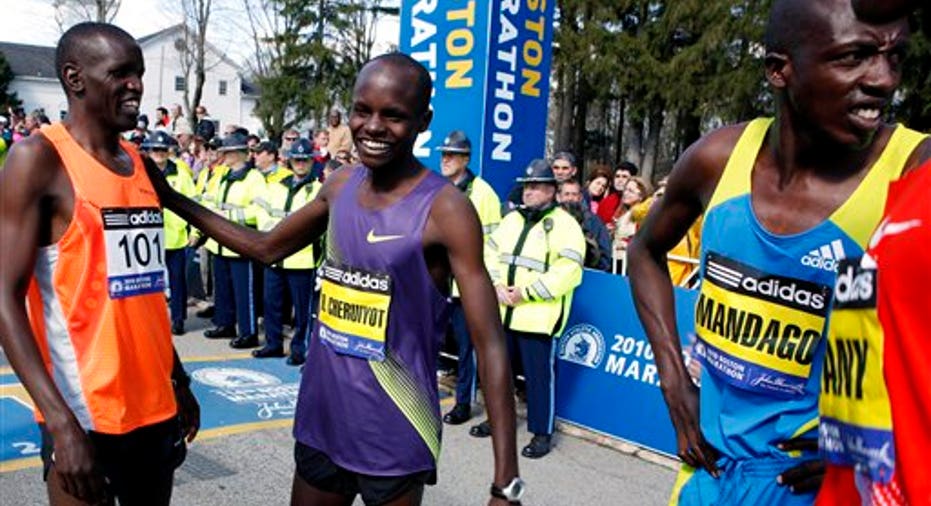Making the Starting Line: The Real Cost of Marathon Running

With the ING (NYSE:ING) New York Marathon just four weeks away, runners worldwide are preparing for the physical and emotional journey. But in addition to valuable time and energy, runners must also be prepared to invest a substantial amount of money to cross the finish line safely.
“It’s like a roving country club,” says Runner's World chief running officer and participant in more than 100 marathons, Bart Yasso. “Instead of being a member of a country club, marathon runners have a ‘marathon club,’ and they feel like they have a stake in running.”
Although entry fees to participate in a marathon are far lower than any country club dues -- some can be as low as $50 per race -- the average marathon costs participants around $1,000 in total, according to Yasso. The breakdown is as follows:
Two pairs of running shoes: $200
Airfare to get to the marathon: $275
Hotel rooms to stay during the marathon: $250
Meals: $100
Clothing: $100
Entry Fee: $75
“When it comes to the actual entry fee in marathon running, it’s a steal,” Yasso says. “You can pay $100 to go golfing, but you don’t get anything but the golf. But with running you get a meal, a shirt, entertainment value, food, drink -- it’s a pretty cool setup in marathon running.”
Travel expenses are really where marathon runners feel the burn -- yet the travel is often the big draw for many participants.
“It’s all about the socialization of the runner. They love to travel and be a part of big cities and see the country, and they use running as that vehicle,” says Yasso.
Of course, the expenses incurred during the marathon itself say nothing of the investment in the months or the year leading up to the event.
“If you are already a runner, then you need around four months to train leading up to the marathon,” says Andrew Kastor, ASICS running coach based in Mammoth, California. “If you've never even bought a pair of running shoes, then you can expect to train for around nine months.”
Kastor charges $150 per month for an e-mail training program tailored to an individual runner’s needs. The program discusses everything from scheduling time to run during the week to what types of foods should be eaten before and after a run.
“It’s all about devising a race strategy,” says Kastor. “I have clients who text me, and then once or twice a week we e-mail, and once or twice a month we talk on the phone. I keep up to date with all of them, and see how they’re progressing.”
Kastor says he recommends his runners join a running club in their local area where they can meet and run as a group. Fees typically run between $50 and $100 for those types of clubs.
Brendan Cournane, an endurance running coach based in Chicago, teaches private running sessions to clients interested in half and full marathons. One-on-one sessions to improve speed cost $90 an hour, or $50 per half hour. Cournane also trains groups of up to 200 people for a 22-week program that costs around $150, and suggests that all his runners join a gym for weight training and aerobic exercises on the days they aren’t running.
“It’s all mental,” says Cournane. “Those who join a training program find it a lot easier to get out on a Saturday morning in inclement weather than if they had to get out of bed and run it by themselves.”
But the main thing that can keep a runner in bed isn’t lack of motivation, according to Dr. Ed Kornel, a neurosurgeon based in White Plains, NY and Director of the Institute for neurosciences and northern Westchester hospital.
“Every runner needs to spend some time going to their orthopedist or a spine surgeon asking what may or may not have occurred to them. It might be a $200 visit, but they’ll spend much more on medical bills if they get an injury running,” says Kornel.
Every runner should have a general checkup before they run a marathon to make sure there’s nothing else they need to be concerned about, and buying the best pair of running shoes possible is key to staving off injury, Kornel says. Runners should purchase a new pair of shoes at least every six weeks, and should consider investing in a heart monitor, which can cost between $100 to $350.
Of course, with running, as with any sport, there are the “basics” of getting in the game, and then there are the incidentals. Patty Briotta, a marathon runner based in Arlington, Va, says that the amount she has spent to run the New York Marathon in the past totaled well over $1,000.
“There are all these little things that you don’t think about that really add up,” says Briotta, who mentioned a product called “Body Glide,” which costs $10 per tube and helps runners prevent chafing under their arms and on their nipples while running. “That’s something you need, but it isn't exactly on the list next to running shoes.”
Briotta also mentioned sunscreen as a running necessity, which costs about $10 per tube, good socks which run about $12 per pair, blister bandages which cost $5 per package, and a good pair of running sunglasses (that don’t bob up and down on your face) which cost between $30 and $100.
But for all participants in any sport, the question always comes down to whether the benefits outweigh the inconveniences. No matter how much runners can budget and keep their marathon costs to a minimum, if it isn’t fun, it isn’t worth it.
“We definitely have fun,” Briotta says. “We’re generating endorphins to keep us in good spirits, and most of the time we tend to be a happier, healthier group of people. If we didn’t love it, we wouldn’t be out there, no matter how much it costs.”



















